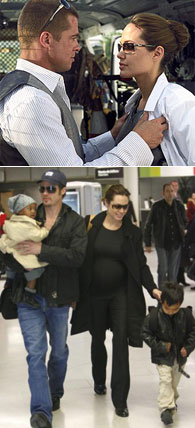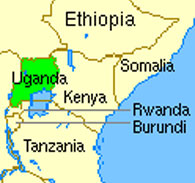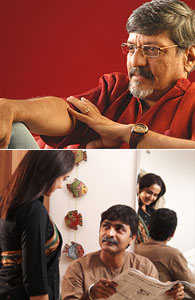Brad Pitt won't marry Angelina until same-sex couples can
Hollywood actor Brad Pitt has said in an interview released last Friday that he will not marry Angelina Jolie, the mother of his newborn daughter until all gay couples in the US can legally tie the knot.

The couple, who met in the 2005 film Mr & Mrs Smith (top pic), have joint guardianship of two adopted children, four-year-old Maddox and 18-month-old Zahara.
The interview revolves around what Pitt thinks of parenthood, life in the public eye and his new family. The couple, who met in the 2005 film Mr. & Mrs. Smith, have joint guardianship of two adopted children, four-year-old Maddox and 18-month-old Zahara.
Last year Academy Award Winner Charlize Theron told reporters she would not marry boyfriend Stuart Townsend until gay and lesbian marriage was legalised.
Pitt has also revealed that he doesn't treat his adopted children, Maddox and Zahara, any differently to his first-born, Shiloh. He explained: "They're as much of my blood as any natural born, and I'm theirs. That's all I can say about it. I can't live without them. So, anyone considering adoption, that's my vote."
Considering his new parenting role, Pitt has said that he will only accept new jobs based on what is suitable for his children. He added that his latest offering Babel is a film he would be proud to have his three kids watch when they're old enough.
"My thoughts these days are, 'Oh, my God, what did I do? What are they going to see from the past?' It definitely colours what I'll approach in the future. I'll try to be a little bit more mature about my decisions," Pitt said.
Rights group slams printing of alleged gay men and lesbians' names in Ugandan tabloid

According to a news release issued by OutRage! at the request of Ugandan LGBTI organisations, the women include two boutique owners, a basketball player and the daughters of a former MP and a prominent Sheikh. The men outed last month include army officers, priests, university lecturers, entertainers, bankers, students and lawyers. The tabloid also published details of five venues popular with gays and lesbians.
Under the headline, "Kampala's Notorious Lesbians Unearthed", the tabloid published a photo of two unnamed women embracing at a party.
The article urged readers to phone the tabloid with details of any lesbians they know: "To rid our motherland of the deadly vice (lesbianism), we are committed to exposing all the lesbos in the city. Send more names us (sic) the name and occupation of the lesbin (sic) in your neighbourhood and we shall shame her," Red Pepper urged.
The HRW said in a statement last Friday the publication of the first names, workplaces and other identifying information of the 45 men could presage a government crackdown of gays in the country where the lesbian and gay community has long been stigmatised and harassed by government officials. In Uganda, sodomy is a crime punishable by life in prison.
"For years, President Yoweri Museveni's government routinely threatens and vilifies lesbians and gays, and subjects sexual rights activists to harassment," HRW researcher Jessica Stern said in a statement.
"At a moment when sensational publicity has spread fear among a whole community, the authorities must exercise their responsibility to protect, not persecute."
The HRW said similar allegations by the tabloid have led to police action. It said that in 2002, the paper ran banner headlines and photographs about an alleged wedding between two women. Following the report, the women in question were promptly arrested. Although they were freed when an attorney intervened, they were jailed again and held for several days, allegedly for their own safety, after a mob threatened them. A Ugandan pastor who had counselled them was later forced to leave the country.
A Red Pepper editor, who asked not to be named, denied HRW's accusations telling the BBC that the publication was not on a witchhunt and that no man on the list was identifiable.
"It's one of the interesting things for people to read in a tabloid because in African societies homosexuality is still seen as strange. We've also printed a list of cheats - people unfaithful to their partners - also with first names etc, because people like reading about other people's vices.
"People are not going to attack you or arrest you - I don't remember anybody being prosecuted in courts of law because someone's gay or lesbian," the editor said.
Those who were outed will however undoubtedly live in fear of being arrested, ostracised by their families or sacked from their jobs.
There have been a series of government-backed attacks on the Ugandan LGBTI community in the last year, including an illegal police raid on the home of the lesbian leader of Uganda's LGBTI (lesbian, gay, bisexual, transgender and inter-sex) movement, Victor Juliet Mukasa, in July 2005.
Meanwhile, the organisation is calling on the Ugandan government to put an end to homophobic statements by officials, repeal the country's sodomy laws, and offer protections from harassment both for gays and lesbians and those who work in organisations that serve their community.
Same-sex sexual relations are criminalised in Uganda under a sodomy law inherited from British colonial rule. Section 140 of the Penal Code criminalises "carnal knowledge against the order of nature" with a maximum penalty of life imprisonment. Section 141 punishes "attempts" at carnal knowledge with a maximum of seven years imprisonment. Section 143 punishes acts of "gross indecency" with up to five years in prison. In both Britain and Uganda, these terms were long understood to describe consensual homosexual conduct between men.
Related site:
Sexual Minorities Uganda (SMUG) official statement on the Red Pepper gay list published on the 8 August 2006
New Bollywood film confronts homosexuality
Quest, the third in veteran Indian actor-turned-director Amol Palekar's trilogy on sexuality will open later this month in India.

Veteran Indian actor-turned-director Amol Palekar's Quest, the last in his trilogy on sexuality, tells the story of a wife who learns of her husband's gay relationship.
Palekar said he wanted the issue to be confronted openly despite Indian society being largely conservative. Sexual relations between two men is a crime under laws that dates back to British colonial rule. Health authorities recently called for a repeal of the 145-year-old law that makes gay sex a crime, punishable by up to 10 years in jail.
"We have the tendency of not talking about issues like homosexuality openly. We tend to brush it under the carpet," Palekar said. "My way of dealing with things is to face them upfront," he was quoted as saying in the Mumbai Mirror newspaper.
Palekar, who was a popular actor in the 70s-80s wrote on the Brisbane Film Festival's web site: "A cumulative social silence leads to irrational fears born out of ignorance; individual awkwardness transforms into collective prejudices and biases. Homosexuality is one such abandoned theme that we prefer to keep closeted. We consider homosexuality to be an indecent, unnatural deviation from what is 'normal'. It is declared to be immoral and, hence, illegal. Our homophobia instigates hatred and violence."
The 62-year-old hopes for viewers of the film to come to "respect the rich diversity of identities and alternative ways of being, rather than unleashing ostracism and condemnation."
"People term homosexuality as unnatural. Homosexuality is not unnatural," said Palekar. He said that in his movie the wife grapples with whether she would have reacted differently if her husband was in an extramarital relationship with another woman. "I'm dealing with this multi-layered issue," said Palekar. "Would things be okay if her husband was seeing another woman?"
Quest and Thaang - which was shot in Marathi with the same cast - will release simultaneously on 29 September in Pune and Mumbai. After which Thaang will be showcased in various parts of Maharashtra. Quest will then be shown in cities like Delhi, Calcutta, Bangalore and Chennai till around December.
